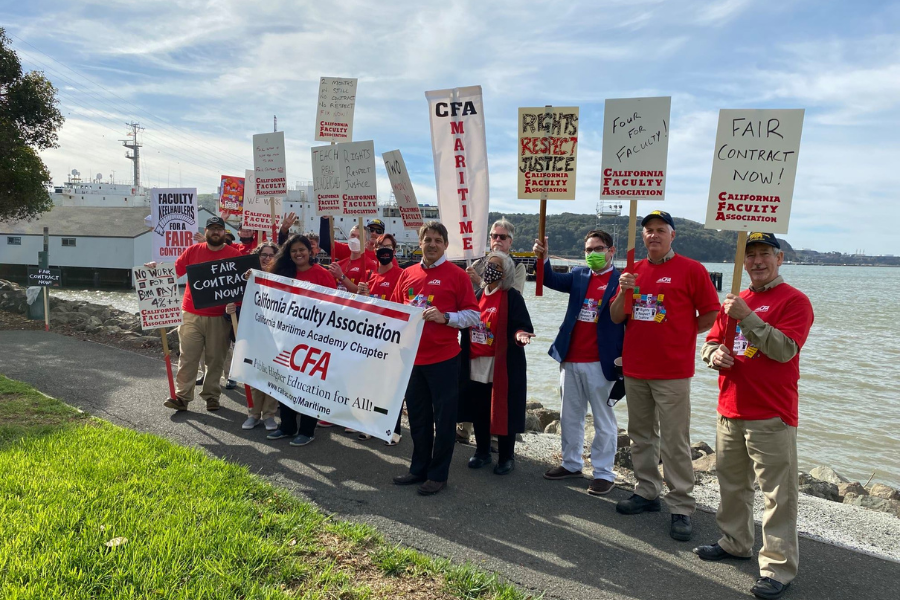Faculty Demand Shared Governance Regarding Cal Poly SLO / CSU Maritime Restructuring
In early June, CSU management revealed plans to integrate the CSU Maritime and Cal Poly San Luis Obispo campuses.
This decision to restructure follows a 30 percent decline in enrollment over the past seven years at CSU Maritime. The Vallejo campus, which once enrolled 1,100 students, now enrolls closer to 700 students.

CSU management has made significant budget cuts that have left positions unfilled. They claim that any further reductions to CSU Maritime’s budget risks compromising its infrastructure and academic mission.
However, estimates show that merging the two institutions will cost $35 million over seven years, and there have been no clear indications of what the potential cost savings will be.
In July, CFA members submitted a Request for Information (RFI) to gather information regarding the restructuring plan. In the RFI, we inquired about alternative considerations besides the integration, expected course cuts, possible department and/or program eliminations, and operational, logistical, and regulatory details included in the estimated $35 million transition costs.
After a month of waiting, management responded by rejecting all of our requests and declined to provide a substantive response.
For faculty, these restructuring plans emerged unexpectedly, and the lack of transparency generated significant concern.
Several faculty voiced their worries at Tuesday’s CSU Board of Trustees meeting about how this plan would be implemented.
“Currently, there are 22 working groups involved on the integration of SLO and Maritime, mostly composed of administrators and staff, with only one working group including faculty,” said Aparna Sinha, CFA Maritime President and CSU Maritime Professor. “This integration will impact the lives of thousands of students and faculty, yet those who are most affected are barely represented. Without the input of faculty experts, this could become a very costly endeavor financially and operationally.”
Jennifer Mott, a CFA San Luis Obispo member and Cal Poly San Luis Obispo Professor, sees potential in restructuring to expand programs and give students and faculty new opportunities for projects and collaboration. However, she is concerned about the lack of information regarding this massive project. “Our critical concerns include a lack of transparency and faculty input on possible program consolidation, since the curriculum is the purview of the faculty and owned by us,” she said.
Troubled by the challenges and potential layoffs that lecturers would face, CFA San Luis Obispo Lecturer Representative and Cal Poly San Luis Obispo Lecturer Tad Walters remarked, “I request this Board ask the Chancellor’s Office if they plan to reduce full-time faculty through layoffs and/or attrition as well as reductions in part-time lecturers’ workloads to zero WTUs (Weight Teaching Units) at either or both campuses once they are fully merged. Please make the Chancellor’s responses public.”
CFA San Luis Obispo Department Chair Representative Silvia Marijuan raised another concern after she learned from a CSU Maritime department chair that Spanish and Mandarin programs were being suspended at their campus.
“What will happen to faculty if their programs are suspended? Will Cal Poly SLO need to absorb those faculty members? How will that work? We need clarity, and we need to be consulted and included as part of shared governance,” said Marijuan, Cal Poly San Luis Obispo Professor.
All CFA members addressing the restructuring urged the CSU trustees to share details about the plan, how it was being developed, and when it would be shared with faculty.
The Academic Senate of the California State University (ASCSU) has also expressed similar concerns about the lack of transparency and shared governance in their resolution.
In addition to these shortcomings, both campuses are grappling with serious issues related to toxic campus culture. At CSU Maritime, homophobia, transphobia, racism, and sexual misconduct are rampant, and administrators are failing to adequately address these incidents. Meanwhile, Cal Poly San Luis Obispo has reported some of the highest rates of sexual assault within the CSU.
If the campuses proceed with restructuring, it is imperative that they take drastic measures to prioritize the safety of faculty, students, and staff. CFA members have been advocating for Title IX reform to ensure survivors feel acknowledged, seen, and heard, but management must do more than just comply with policies and procedures if they want to see positive change on their campuses.
A vote on the campuses’ restructuring is set to take place during the November Board of Trustees meeting. If approved, the plan would take effect beginning July 2025 and impact students in Fall 2026.
CFA members will continue to demand transparency and accountability, and we will continue to exercise the right to information requests and fight any stonewalling by CSU management.
Join California Faculty Association
Join thousands of instructional faculty, librarians, counselors, and coaches to protect academic freedom, faculty rights, safe workplaces, higher education, student learning, and fight for racial and social justice.